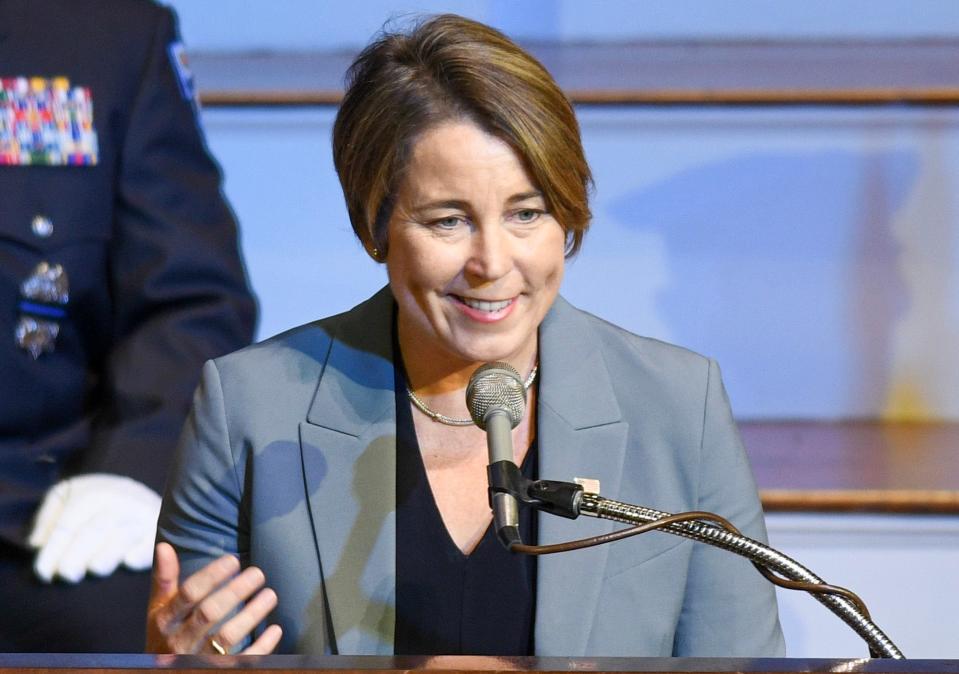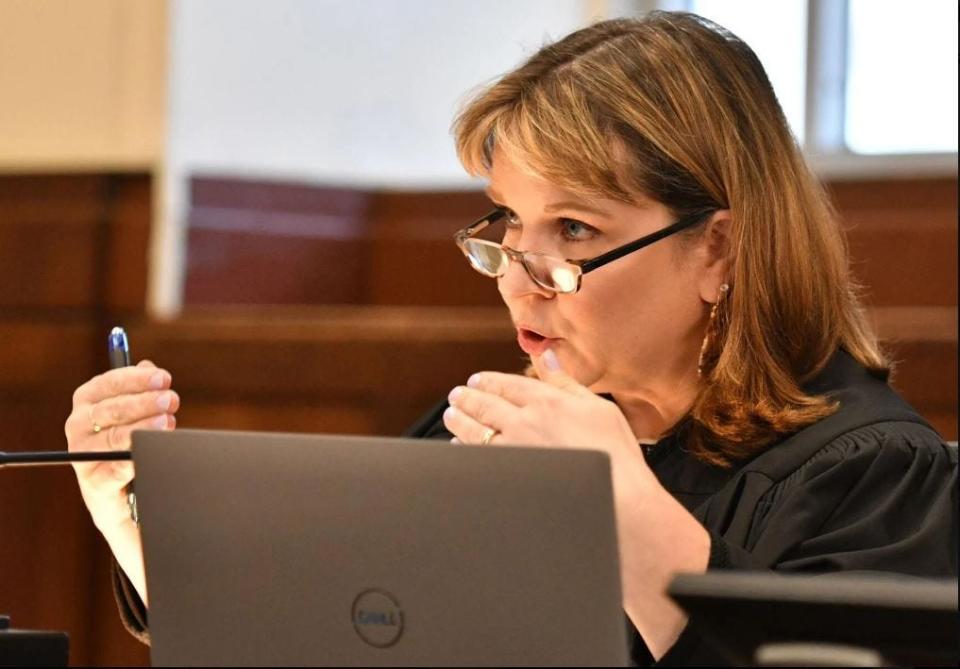Changes in federal immigration policy prompted legislators to seek in-state system review
- Oops!Something went wrong.Please try again later.
It’s almost as if they were prescient.
Sen. Robyn K. Kennedy, D-Worcester, following in the footsteps of her predecessor, Harriette Chandler, filed legislation at the start of the session that calls for the creation of a special commission to study refugee resettlement infrastructure in Massachusetts to ensure newcomers are integrated into the state’s social and economic fabric.
In discussing the measure Friday, Kennedy said it was first filed by former Chandler and Rep. David LeBoeuf, D-Worcester. The legislator indicated that it was filed partially in response to the reduction in services that occurred under the Trump Administration and subsequent changes in federal immigration policies.
The changes in administrations, from Trump to Biden, also prompted changes in the protected status of certain refugees. Those changes, coupled with the inequities revealed by the COVID-19 Pandemic, prompted the legislators to propose creating a commission to ensure that once migrants arrived in Massachusetts they could also thrive.
Ensure people live fulfilling lives
“How can we ensure their success in the United States as they start their new lives?” LeBoeuf said is the question with which he is grappling.
The bill’s goal is to create a body that would review the state’s existing infrastructure, identify the changes in eligibility of people migrating to the state and to work with service providers across the state to identify and fill in any gaps.
“We need to coordinate services and understand where the gaps exist so we can make strategic investments,” Kennedy said, adding that there has been an increase in new families accessing the state’s emergency shelter system and the state must ensure adequate support for them.
“We need to respond to meet all emergent needs of all our residents, whether they have been here for 50 years or 50 minutes,” Kennedy said.
While the bill has had successful hearings in committee in the past, it never quite made it over the finish line in both houses. It was recently favorably heard by the Joint Committee on Children, Families and Persons with Disabilities, but it has yet to be acted on by legislators.
Not willing to wait for the state to act, Worcester legislators made sure the city was in a position to help resettle local residents and migrants housed locally through the state’s emergency system by including funding for a coordinator position in fiscal 2024 state budget.
“The position was intended to work within the bigger picture,” Kennedy said.
The $100,000 stipend has been allocated to Friendly House and the hiring of a special coordinator to connect local service providers and agencies and to ease the transition for families seeking emergency shelter.
“The commonwealth has stepped up in the past when we had refugees from Vietnam, from Liberia,” LeBoeuf said, adding he sees no indication that there will be a slow-down in refugees coming to the United States given the crisis in international relations. “Massachusetts needs to figure out, 'How are we ready? How do we prepare going forward?'”

The coordinator position was filled months before Gov. Maura Healey declared the state of emergency in August, a response to the influx of migrants streaming into the state. And months before legislators started discussing changes to the 1983 right to shelter law that affords families and pregnant women with emergency shelter by right.
“If you are from the family values party, you should not be introducing legislation that would put women and children to sleep in the street,” LeBoeuf said, adding that people should not be punished for being poor.
Legislators have filed measures that would exclude new arrivals to Massachusetts from being eligible for shelter and limit those the state can help to people who have been living in the state for three years or longer.
LeBoeuf noted that while the current crisis is due partly to the influx of migrants, many of those sheltered by Massachusetts are long-time residents forced from their dwellings by circumstances.
LeBoeuf: 'Sad reality; people in shelters are working'
“We may have the highest minimum wage in the nation, but when you compare salaries to housing prices, people can be working multiple jobs and still not be able to afford to pay rent,” LeBoeuf said. Legislators need to craft a multi-pronged approach to address the problems: High housing prices, the high cost of child care and early childhood education.
The proposed commission would seek out cracks in the existing system and could propose permanent fixes.
With the emergency shelter system bulging at the seams and the state running out of the allocated funding for the system as well as running out of shelter spaces, the governor announced she would cap it at 7,500 families, institute a waiting list and possibly set a limit as to how long people receive services.
The announcement came after she requested the legislature allocate another $250 million to the system on top of the $310 million included in the fiscal 2024 budget. That original amount was calculated to be sufficient for the 3,100 families that were expected to seek help. The state estimates it currently spends $45 million a month on the shelter system.
Friday, there were almost 7,400 families in the system; the Administration has calculated that without a cap, the number could reach 13,000 by year’s end. Administration figures have indicated the state will spend about $1.1 billion on sheltering both established and new residents.
The legislature declined to add the $250 million to the close-out supplemental budget. Lawmakers also requested more information, from a ballpark figure of the number of migrants Massachusetts could expect in the coming months to a plan to address the crisis.
That plan has been shaping up for months. Healey activated the Massachusetts National Guard to act as liaison between service providers and migrants, especially in areas where service providers are scarce. She has also appointed a Lt. General L. Scott Rice (retired), a former Air National Guard commander, to coordinate and implement her plan.

The governor has sought federal assistance in addressing the crisis, requesting that the Biden Administration expedite work papers for eligible migrants to allow them to leave the shelter system as well as fill gaping holes in the state’s workforce. She has established two job-related programs: One to match migrants with job openings as well as a training program to prepare them to enter the work force once they have their paperwork in order.
The governor is also asking for federal funding to support the state as it integrates migrants into the social and economic fabric of Massachusetts. Healey has also asked the federal government to establish a collective shelter in the state.
Just last week, Edward M. Augustus Jr., secretary of Housing and Livable Communities, issued new guidelines for acceptance into the state’s emergency shelter system.
However, Lawyers for Civil Rights, based in Boston, filed a lawsuit seeking to stop the governor’s cap, claiming that the cap, coupled with a waitlist and new triage criteria reflect de-facto changes in the state’s right to shelter law.
Judge allows governor to cap the shelter system, launch a waitlist, triage applicants for emergent needs
Wednesday, Superior Court Judge Debra Squires-Lee, sitting in Suffolk County, denied the motion for the stay.
The suit alleged that the Healey/Driscoll Administration failed to follow parameters for changing the emergency shelter system that were included in the fiscal 2024 budget. Any changes in the system, according to the line item, would be allowed only after the legislature was alerted to deficiencies in the system by written report. Then lawmakers would have 90 days to address the shortfalls.
The judge said the legislature had more than adequate notice of the dwindling resources to fund the system with the governor’s emergency declaration and her request for additional funding.
“The House continues to work towards providing emergency assistance funding in the coming weeks,” said House Speaker Ronald Mariano, D-Quincy. “However, it is our understanding that the Administration’s decision to institute a cap and waitlist has never been tied to the passage of a supplemental budget.“
On the Senate side, Senate President Karen Spilka, D-Ashland, in a prepared statement said: “As the crisis with emergency shelter continues, I am once again joining those asking for help from the federal government to provide much-needed funding, expedited work authorizations and the resources to establish a congregate site to provide shelter.
“We are facing a difficult and unprecedented time in our commonwealth and I continue to believe that, while we must help ensure that no family or child faces sleeping on the street, we need help to do so,” Spilka said. “I am grateful for the Healey administration’s leadership and I look forward to working with our partners in the Administration and across government to find a way forward to protect the most vulnerable among us.”
For her part, Kennedy is continuing to have conversations with her colleagues in both houses regarding her proposed legislation and she is working within the committee to move the bill along with some 167 other measures the committee is considering.
This article originally appeared on Telegram & Gazette: MA lawmakers say state must find and address gaps in shelter system

